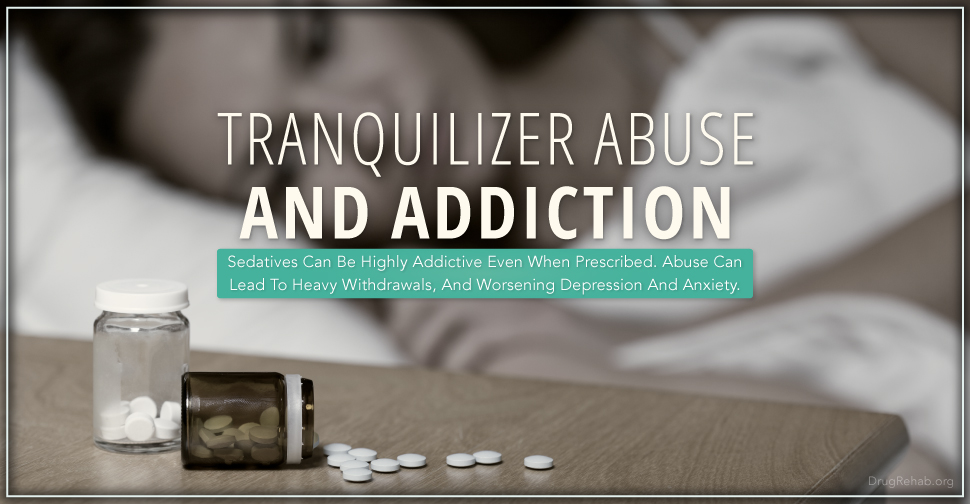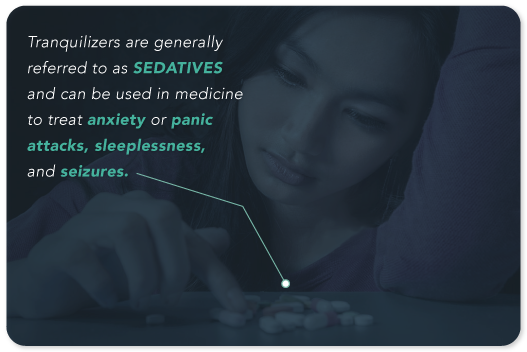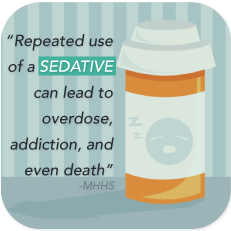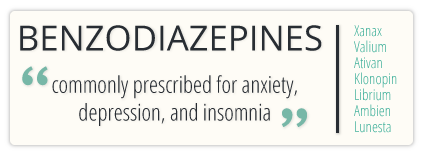
In medicine, tranquilizers (also known as sedatives) can be used for treating depression, anxiety and insomnia. Sedatives can be highly addictive even when prescribed. Physicians make it a point to help people wean-off such drugs so they can continue leading full, substance free lives. The trouble is when people start self-medicating and abusing sedatives, because there is no telling how strong a prescription they are taking and they are almost pre-destined to become addicted. Sedative abuse can lead to heavy withdrawals, and worsening depression and anxiety.
There are millions of people in today’s American culture who abuse tranquilizers, and whether their drug of choice is a benzodiazepine, a barbiturate, or another sleeping pill, they are all likely to be suffering from a horrible addiction. Tranquilizers aren’t just something you shoot out of a gun to sedate an animal, they can also be drugs used to calm a person suffering from an anxiety disorder or a hyperactivity disorder (such as ADHD).

The problem with sedatives and tranquilizers is that even though, in medicine, they are used for calming a person without inducing sleep, they are also highly addictive, and they give a person a calming high which can be considered a type of drug euphoria.
What Are Tranquilizers?
Tranquilizers are drugs that have a calming effect without inducing sleep. They are generally referred to as sedatives, and can be used in medicine to treat anxiety or panic attacks, sleeplessness, and seizures. Different types of sedatives include benzodiazepines, barbiturates, and other sleep aids. Here is a list of more common names of sedatives:
Benzodiazepines – Are commonly prescribed for anxiety, depression, and insomnia. Benzodiazepines come in many shapes and sizes, though they are readily available, and unfortunately, easy to receive a script for.
Barbiturates – Were once commonly prescribed for anxiety, though they have taken the back seat to benzodiazepines, they are still commonly used in veterinary practices and also for seizures.
- Seconal

- Mebaral
- Luminal
- Nembutal
- Rohypnol – A sedative that is not legally prescribed in the United States; however, shipments of the drug can be obtained in other countries like Mexico and are often smuggled across the border. These drugs are more commonly known as “date rape” or “roofies.”
How To Tell If A Person Is Abusing Sedatives
A few indications of sedative abuse, are depression, slurred speech, disorientation, dilated pupils, aggression or agitation, headaches, and thoughts of suicide (Massachusetts Health and Human Services – MHHS). Any drug user can do a wonderful job of keeping their problem under wraps. Unfortunately, even if you want to give your loved one the benefit of the doubt, sometimes it’s best to do a little extra research to learn more. You can call us anytime at 1-833-473-4227 if you have questions about a tranquilizer addiction.
Self-Medication With Sedatives
Sometimes people will “self-medicate” with sedatives; this is highly dangerous and ill-advised. Medications that have not been prescribed by a professional can come with severe physical and mental health consequences. “Patients take controlled substances that have been prescribed for specific conditions, such as sedatives for panic attack disorder, in order to obtain other benefits: to induce sleep, reduce anxiety from stressful life circumstances, elevate their mood when depressed, or provide additional energy” (National Center for Biotechnology Information – NCBI).
Can A Person Overdose On Sedatives?
“Repeated use of a sedative can lead to overdose, addiction, and death” (MHHS). Sedatives can also lead to seizures and other withdrawal symptoms. Sedatives and other mood altering drugs can be extremely dangerous if taken incorrectly, but the sad truth is, sedative addiction can take place even when the drug has been prescribed.

Withdrawals From Sedatives And Tranquilizers
Because sedative drugs can have addictive properties, weaning-off these “mood-altering” drugs is not an easy job. The mind and body become addicted to drugs, because of the good feeling and euphoria they provide. Once a person becomes addicted to sedatives, they will likely have withdrawals once they try to quit. Sedative withdrawal symptoms can include:
- Sleep Disturbance
- Irritability
- Increased Tension and Anxiety
- Panic Attacks
- Hand Tremor
- Sweating
- Difficulty Concentrating
- Dry Retching and Nausea
- Weight Loss
- Palpitations
- Headache
- Muscle Pain and Stiffness
(NCBI)
Medical Treatment For Sedative Addiction Recovery
In the medical field, monitoring of sedative intake is necessary to ensure an easy transition to discontinuing use. Stopping abruptly can also be dangerous and can intensify withdrawals, and other mental health complications like depression and anxiety.
Healthcare professionals will usually advise a person to slowly stop taking a tranquilizer, and may even lower the dosage or strength of the drug. As a person is lowering their intake of a drug, he/she will very likely be put on a detoxification regimen, and behavioral therapy.
Other Frequently Asked Questions About Tranquilizers
If you’re struggling with an addiction to tranquilizers sedatives you might have some questions like:
- What will happen if I decide to quit sedatives cold turkey?
- What other kind of treatment is there for anxiety, or panic attacks?
- What happens if I drink alcohol while I’m weaning off of sedative medication?
- What should I do if I think someone I love is abusing sedatives?
- What should I do if I think I might be abusing sedatives?
- What other types of tranquilizers are there?
Where To Find Treatment For Addiction
There is an answer! Though there isn’t necessarily a one size fits all approach to treatment, we have knowledgeable staff who can help you find the right treatment for you. Contact Us today is you or someone you love might be suffering from an addiction to tranquilizers and sedatives. Drug abuse and addiction to tranquilizers doesn’t have to be a losing battle…
For More Information Related to “Tranquilizer Abuse and Addiction” Be Sure To Check Out These Additional Resources From DrugRehab.org:
- The Effect Of Benzodiazepines On The Brain
- How To Detox From Benzodiazepines
- The Dangers Of Mixing Prescription Opiates And Benzodiazepines
- Using Benzos To Potentiate Opiates: A Deadly Combination
- Dealing With The Loss Of A Loved One From Drugs Or Alcohol
Sources
Massachusettes Health and Human Services – Sedatives and Tranquilizers
National Center for Biotechnology Information – The Benzodiazepine Withdrawal Syndrome
National Center for Biotechnology Information – Prescription Sedative Misuse and Abuse



